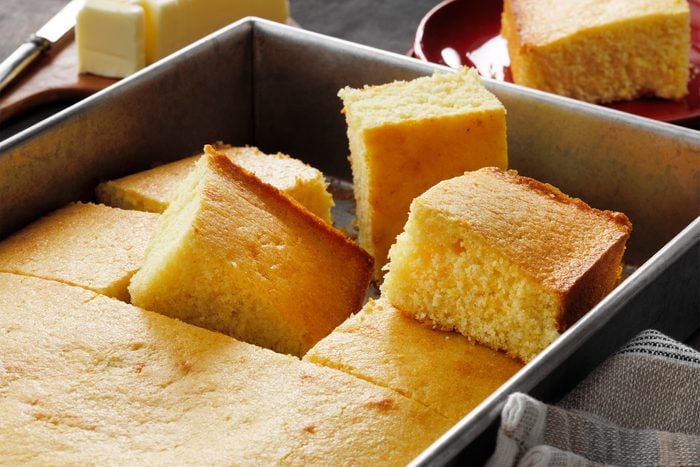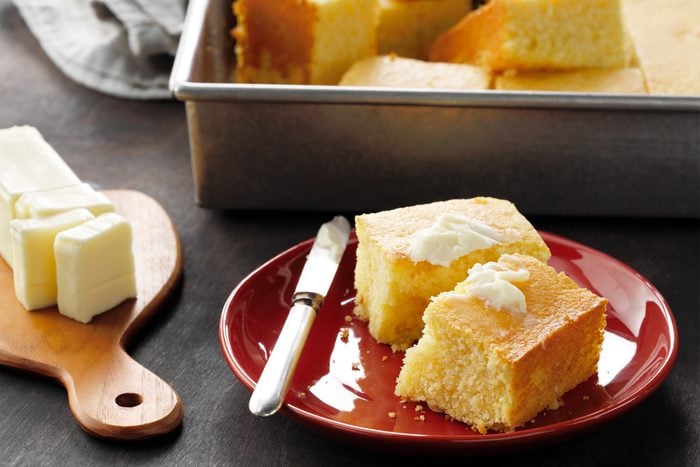Chili, barbecue, slow-cooked beef—whatever the comfort food, it probably pairs well with a buttery square of cornbread. And while we love the nostalgia of baking a quick cornbread from a box of Jiffy, nothing compares to the tender crumb of a homemade cornbread recipe. Because this recipe yields quite a bit of batter, it’s one of those perfect 13×9-inch bread recipes. Or, you can do some baking pan conversions and use a 12-inch cast iron skillet for that signature crispy bottom.
Ingredients for Cornbread
- Butter: Butter replaces oil in this recipe to give the cornbread its moist texture and a richer depth of flavor.
- Eggs: Eggs give the cornbread its structure; they also work with the butter to moisten the batter.
- Milk: The 2% milk in this recipe brings an extra layer of fat to the batter that will help deliver a tender crumb—a defining characteristic of cornbread!
- All-purpose flour: Because cornbread cooks up from a batter rather than a kneaded dough, all-purpose flour is the best bet for a soft, almost cake-like texture (rather than the chewier texture you’d get from bread flour). For a quick refresher, here are the different types of flour and when to use them.
- Cornmeal: When considering how to make cornbread, the bright yellow cornmeal is key. Fine- to medium-grind cornmeal is best in baked goods.
Directions
Step 1: Make the batter
Preheat your oven to 400°F. In a large bowl, cream the butter and sugar together for about five to seven minutes until they’re light and fluffy. In a second bowl, combine the eggs and milk. In a third bowl, combine the dry ingredients: flour, cornmeal, baking powder and salt.
Alternately add the dry ingredients and the egg mixture to the large bowl of creamed butter and sugar. Fold the mixture together until no clumps of dry ingredients remain.
Step 2: Bake the bread
Pour the cornbread batter into a greased 13×9-inch metal pan and bake for 22 to 27 minutes or until a toothpick inserted into the center comes out clean. Cut the bread into squares and serve warm.

Cornbread Variations
- Double the corn: If you love the flavor of sweet corn, stir in 1-1/2 cups of thawed frozen corn to the batter.
- Add jalapenos: Wondering how to make cornbread more spicy? Seeded and sliced or chopped jalapenos will do the trick. You could also follow this recipe for jalapeno buttermilk cornbread.
- Mix in honey: While you could drizzle honey over the top of basic cornbread, you could also cut a bit of the sugar from the batter and replace it with honey so that it bakes through the bread and sweetens it from the inside.
- Add fruit: Have extra cranberries from all your fall baking recipes? Make cranberry cornbread for a sweeter take; it’ll be tasty enough to serve for dessert instead of as a side dish.
- Turn it into stuffing: Make a double batch of buttery cornbread to serve as squares—then turn the leftovers into cornbread stuffing!
How to Store Cornbread
Store cornbread in an airtight container or a resealable storage bag with all the air squeezed out. It can remain in a cool, dark spot in your pantry for about three days. If you want to stretch it to about five days, store cornbread in the fridge.
Can you freeze cornbread?
You can freeze cornbread. Wrap it tightly and keep the bread in a single layer (rather than squares stacked on top of one another) to prevent sticking. Store cornbread in the freezer for up to three months. When it’s time to thaw, simply pop your frozen cornbread in the microwave or oven and heat it through.
Cornbread Tips

What kind of pan is best for cornbread?
While you can use any 13×9-inch pan you have for this recipe, the most classic cornbreads have a moist inside and a crisp outside. Metal pans are better suited to creating that crisp outside because they heat more quickly than glass. If you want to keep things more traditional, a 12-inch cast-iron skillet would bake the cornbread more evenly than a metal baking dish.
Don’t have a cast-iron skillet? This 12-inch Lodge skillet is one of the best cast-iron pans under $50.
Why did my cornbread turn out dry?
Overmixing the batter or overbaking the batter could result in dry cornbread. Because oven temperatures can vary, start checking your cornbread around 22 minutes. If the sides look golden and the center doesn’t look loose, do a toothpick check. Remember that baked goods continue to cook slightly once removed from the oven, so a small amount of cornbread on the toothpick is OK. By the time it cools, the toothpick should come out clean and the inside will still be moist.
How do you know when cornbread is done baking?
You’ll know cornbread is finished baking when the edges are more golden than the rest of the bread, and they start to pull away from the sides of the pan. You’ll also notice the center of the bread won’t be runny anymore.


















